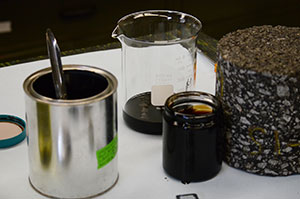UW’s SER and WRI Collaboration on Green Coal-Based Asphalt Featured at Conference
Published July 19, 2023

Coal-based asphalt currently being developed in a collaborative project between Laramie’s Western Research Institute (WRI) and the University of Wyoming’s Center for Carbon Capture and Conversion (CCCC) will be a featured product at the Petersen Asphalt Research Conference. The conference runs through Thursday, July 20, at UW’s Marian H. Rochelle Gateway Center.
Jeramie Adams, vice president of WRI’s Renewable Upcycling, Carbon Materials and Asphalt Technologies, is the lead scientist developing the coal-based asphalt. He will discuss the current developments of the technology today (Wednesday) and how the technology could help the asphalt industry meet lower emissions standards while providing a new high-volume, alternative, domestic source of flexible asphalt pavement binder.
“We have taken Wyoming coal, as a large feedstock, and tried to turn it into a viscoelastic material by chemically reacting it with different bio oils,” Adams says. “Coal or carbon ore can be mined and used like any other raw material not being consumed as a fuel, and it allows us to engineer a product and deliver it to a wide range of markets -- as well as make different products for different applications -- so it is always consistent and performs well.”
The project falls under the carbon engineering initiative in the UW School of Energy Resources’ (SER) CCCC with the mission of finding new alternative uses for Wyoming coal. Using the coal extract produced from the CCCC’s patented solvent extraction technology, the coal-based asphalt binder has shown promising results in performance and superior benchmarks in achieving net-zero emissions goals.
“The benefit here is that we are actually engineering asphalt binders, whereas petroleum asphalt is just a waste product from the oil refining process,” Adams explains. “That product is different depending on the crude oil source or the way that refinery operates. The coal-based binder could be helpful in supplementing petroleum-based asphalt for consistency and lower emissions, or work as a stand-alone product.”

“If we can use coal, which is an ancient biomass, and react it with another biomass, thereby creating a new binder, we have a low-carbon footprint and then make up for things that are lacking with renewable masses,” Adams says. “It is a very green product because there is no need for combustion in any of its outlets, particularly in terms of availability and volumes.”
Because of the accessibility of carbon ore in open-seam Wyoming mines, and the lack of combustion in processing, the coal-based asphalt emits significantly less carbon dioxide than petroleum-based asphalt from cradle-to-gate.
“Using Powder River Basin coal as a feedstock produces a mere third of emissions of conventional petroleum when taking it from the ground and to a refinery for processing,” Adams says. “Furthermore, combining coal with biogenic CO2 allows the new asphalt products to store CO2 from the atmosphere in the pavement. It has the potential to assist petroleum asphalt production meet some of the current challenges posed by the new regulations or to revolutionize the industry as a whole.”
The project is still in early stages but aims to move out of the lab into field tests. It will be heavily dependent on the ability of the CCCC to scale up the corresponding solvent extraction technology to produce enough feedstock for large-scale batches of asphalt.
“Our lab is working in tandem with WRI on scaling up the solvent extraction processing technology to the field demonstration level in the Powder River Basin,” says Trina Igelsrud Pfeiffer, the CCCC director. “We have a lot of great industry partners in the basin, as well as a potential host site adjacent to the mines for easy access to coal. At this stage, the scale up is entirely dependent on available funding but, with the coal-based asphalt being such a promising product on the downstream side, we hope there will be a lot of interest and investment in driving both projects toward commercialization.”
Advancing both projects will be critical in the team’s ability to perform future tests on the product, in terms of performance and economics. While the team has demonstrated the ability to produce performance-grade asphalt, it also will have to show the accompanying techno-economic analysis to bring production costs down.
“Our ultimate goals are to find a new, valuable use for coal and to help decarbonize the asphalt industry,” Adams says. “We have to meet the same rigorous safety and performance standards, but we also have to compete economically. This may become less of an issue in the future with stricter environmental standards, but, for now, we are trying to balance the economics with the products.”
SER will host an exhibition booth at the conference to highlight the asphalt and other coal-derived products.
About Western Research Institute
WRI is a multimillion-dollar, not-for-profit research organization renowned for work in advanced energy systems, environmental technologies and highway materials research and technologies.
WRI provides a highly diverse suite of specialized scientific and engineering expertise, intellectual property, and research and development equipment and facilities, with emphasis in asphalt, biomass, hydrocarbon and polymer resources for energy and material applications.
For more information, go to www.westernresearch.org/.
About the Center for Carbon Capture and Conversion
The CCCC is a Center of Excellence at UW’s SER, composed of a collaborative group of research scientists, faculty members, students and entrepreneurs focused on supporting the future of Wyoming coal.
The CCCC focuses on bolstering existing markets and finding novel, nonenergy uses for Wyoming coal by investigating new high-volume uses for coal, converting coal into valuable engineered and chemical products, and exploring new opportunities in an evolving carbon market.
For more information, click here.

